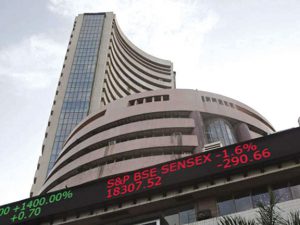Bloomberg
India’s benchmark index was poised to enter a correction as concerns about risks from the rapid spread of the omicron coronavirus variant prompted selling of equities ahead of year-end holidays.
Reliance Industries Ltd. was the biggest drag on the S&P BSE Sensex, which retreated 2.8% to 55,423.99 as of 1:24 pm in Mumbai, headed for its biggest two-day decline since May 2020. The NSE Nifty 50 Index falls 2.9%, with all but three of its members declining. Both gauges were set to enter technical corrections, down more than 10% from their record high closing levels on October 18.
“Markets are under tremendous pressure, a further 5%-6% decline is possible for the benchmark,†said Vishal Wagh, head of research at Bonanza Portfolio Ltd.
Stocks tumbled across the region as concerns that a return of stricter curbs to control the spread of the new variant may hurt nascent economic recoveries weighed on investor sentiment.
The benchmark Sensex rises more than 20% in the first 10 months of this year, aided by the central bank’s efforts to pump funds into the economy and steady buying by millions of first-time investors. The measure’s gain of over 110% from a March 2020 low — when stocks plunged worldwide as the coronavirus spread — is the most among countries with stock markets worth at least $1 trillion.
In recent weeks, brokerages including Goldman Sachs Group Inc and Nomura Holdings Inc. have lowered their outlook for Indian equities, flagging pricey valuations. The Sensex trades at 21 times estimated forward 12-month profits, compared with about 12 times for the MSCI Emerging Markets Index. Foreign investors sold about $1.1 billion dollars in Indian shares this month through December 16.
“All things seem to be coming together for Indian markets, from tax-loss harvesting by the foreign investors to global volatility and the impact of virus spread,†said Vikas Gupta, a strategist at Omniscience Capital Advisors Pvt. He expects volatility to persist in Indian markets for next few weeks as fund managers look to reset portfolios and book profit ahead of the new year.
S&P BSE Small Cap Index falls 4.4%, the most since April 12. All 19 BSE-managed sub-gauges declined, with realty and metal stocks the worst performing groups falling 6.4% and 4.8%, respectively.
 The Gulf Time Newspaper One of the finest business newspapers in the UAE brought to you by our professional writers and editors.
The Gulf Time Newspaper One of the finest business newspapers in the UAE brought to you by our professional writers and editors.
